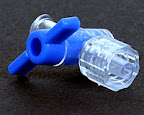 Barbados Butterfly recently posted about her needlestick injury. I hope she is feeling better. I have had three official "patient body fluid exposure incidents" during my career. They were:
Barbados Butterfly recently posted about her needlestick injury. I hope she is feeling better. I have had three official "patient body fluid exposure incidents" during my career. They were:- Giving mouth to mouth at a roadside accident as a medical student, unfortunately to a fatally injured Hep-C positive patient
- With a solid round-bodied needle during a difficult low anterior resection (no stapler)
- At the end of last year, topping up a wound with local anaesthetic at the end of the case.
 By far and away, though, I think the biggest contribution to avoiding needlestick injuries are the needleless infusion systems, using IV bungs (reflux valves) and Luer locks. Unfortunately many hospitals are too cheap to stock true Luer lock syringes (that twist and lock in) and just get Luer slip syringes. In that setting spray exposure from a loose fitting syringe-to-bung is rather common.
By far and away, though, I think the biggest contribution to avoiding needlestick injuries are the needleless infusion systems, using IV bungs (reflux valves) and Luer locks. Unfortunately many hospitals are too cheap to stock true Luer lock syringes (that twist and lock in) and just get Luer slip syringes. In that setting spray exposure from a loose fitting syringe-to-bung is rather common.The needle and the blade will not disappear in the foreseeable future of open surgery. Needlesticks are and will still be a fact of life. I was recently offered specific "needlestick infection insurance", and on reading through the paperwork, the payout was a lump sum on confirmation of new-onset infection:
"A benefit will not be payable if: ... a medical cure is found for Acquired Immune Deficiency Syndrome (AIDS), or the effects of the HIV virus, Hepatitis B or Hepatitis C, or in the event of a treatment being developed and approved which makes these viruses inactive and non-infectious."Even if such treatment is hideously expensive or years away from market availability?
"... you have AIDS or any AIDS related disorder or a positive blood test... unless you are able to provide evidence, in the form of sequence analysis of the source and index virus strains, satisfactory to us that the accident involved the definitive source of the virus."
Why would I be applying for this cover if I already had HIV? What kind of product do these guys think they are offering? I think I will rely on my Income Protection Insurance, so I have thrown it in the bin.





No comments:
Post a Comment